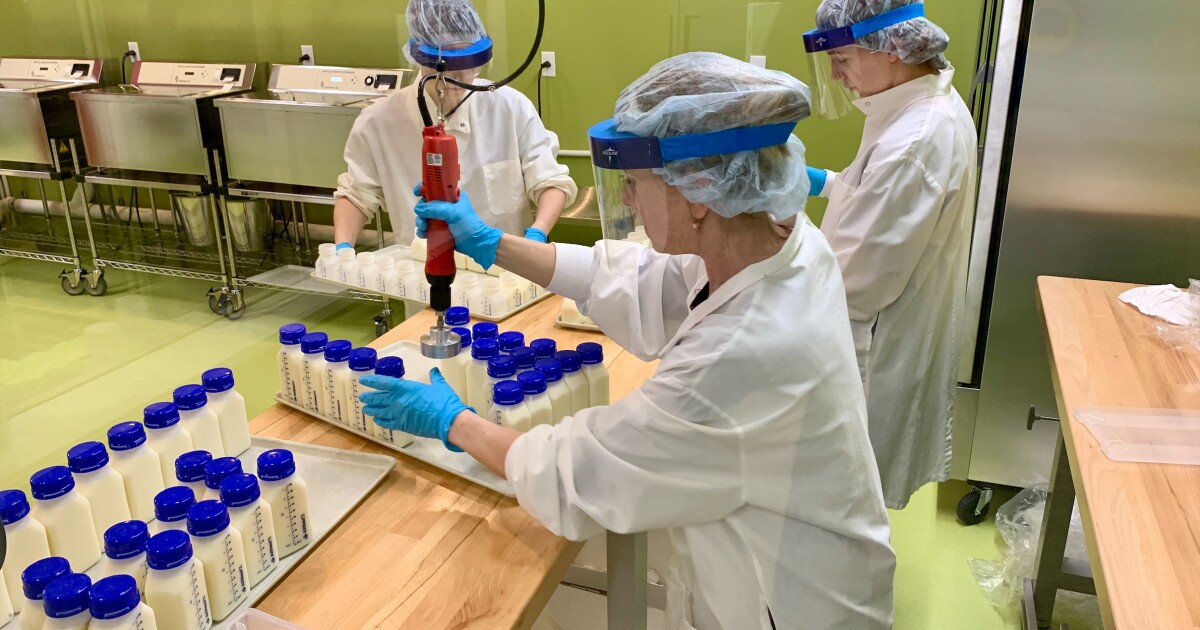The Mid-Atlantic Mothers’ Milk Bank is bottling up big momentum this year — with four new milk depots opening across the region and a cookie-fueled fundraiser on the way to help it keep growing.
The Pittsburgh-based nonprofit has added depots at UPMC Hamot in Erie, St. Luke’s Baby and Me Support Center in Bethlehem, CAMC Women and Children’s Hospital in Charleston, West Virginia, and WellSpan York Hospital in York, Pennsylvania.
Executive Director Denise O’Connor said the expansion reflects a surge in demand for human donor milk.
“We went from no one using donor milk in this area in western PA to within six months of us opening in 2016, every single NICU in Western Pennsylvania using donor milk,” she said. “Within a year, every single level three and four NICU in Pennsylvania and West Virginia were using donor milk.”
Today, O’Connor said, hospitals are using it not only for premature and medically fragile infants, but also for healthy newborns who need temporary supplementation.
“Exposure to human milk early on helps to create a more diverse and better microbiome, which is so important for a lifetime of health.”
She added that early access to human milk also supports long-term breastfeeding success — helping babies stay exclusively breastfed for longer and promoting better health outcomes throughout infancy and beyond.
Pasteurized and labelled donor milk ready for shipments.
The Milk Bank’s growth has been dramatic — from 57,000 ounces of milk processed in its first year to more than 431,000 ounces last year. O`’Connor said that wouldn’t be possible without a growing network of depots, which primarily serves as collection hubs for approved donors.
“The depots are essentially a host,” she explained. “It’s usually a health system or a peds practice, or it could be a midwife center or a birth center that hosts a freezer for us.”
The new depots, hosted by hospitals and birthing centers, allow screened donors to drop off frozen milk locally. O’Connor said that convenience not only encourages more donations but strengthens community awareness.
“We definitely see in the areas where we have depots, where we get an uptick in donations,” she said.
O’Connor said donors often become advocates themselves. “Being able to go to the depots, they really are like the ambassadors of the Milk Bank in their community,” she said.
The Milk Bank’s growth also supports maternal and infant health across the region, particularly in areas with higher infant mortality and racial disparities in preterm birth.
“Not only do we have higher than average infant mortality rates, but we also have some of the widest disparities between Black and white infants in terms of preterm birth. Black infants are at two to three times the risk of having preterm birth than their white counterparts here,” O’Connor said.
For premature babies, donor milk can be lifesaving. O’Connor said it’s possible to dramatically decrease Necrotizing Enterocolitis (NEC) surgeries — a dangerous intestinal disease that affects preterm infants.
“We can decrease those NEC surgeries by like 90%,” she said. “We can decrease the overall incidence of NEC by 50%.”
As the Milk Bank continues expanding its network of nine depots, it’s also working to grow its space. The organization recently purchased the former AHN Medical Arts Building in Bellevue and is raising funds for $5 million in renovations before moving in.
To help fuel that effort, the Milk Bank is hosting its third annual Milk Bank and Cookies fundraiser Nov. 6 at Stage AE, with 20 artisan bakeries and bigger bakeries competing for the best cookie and best cookie table in Pittsburgh.
“It is like a cookie table smackdown — I mean, what could possibly be more Pittsburgh than that?”
O’Connor said the expansion of milk depots and community partnerships represents something much bigger than logistics — it’s about connection.
“They’re how we build an ecosystem where families, hospitals, and donors all work together to give babies the best possible start.”

